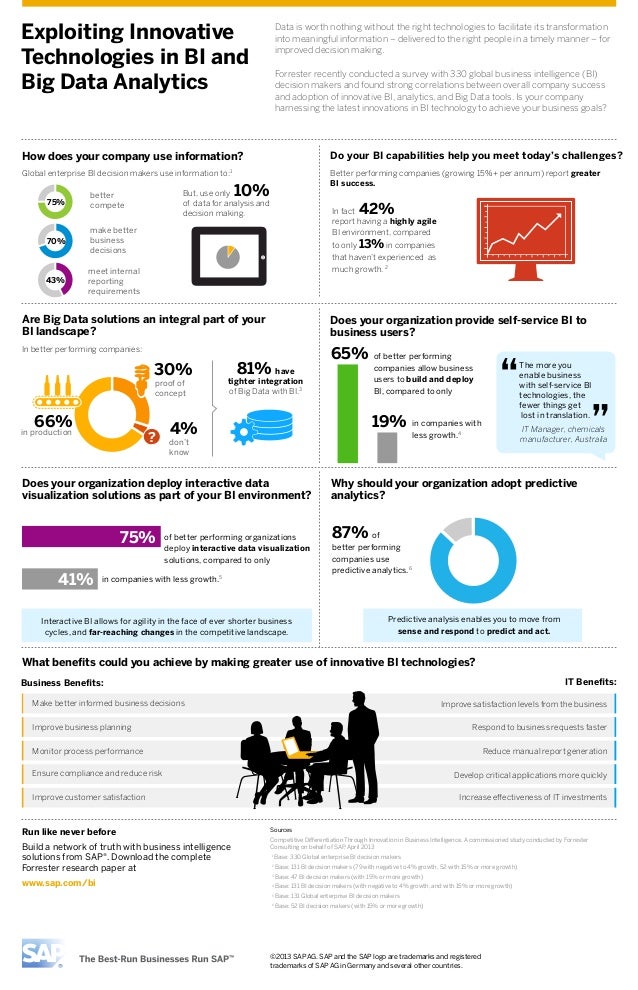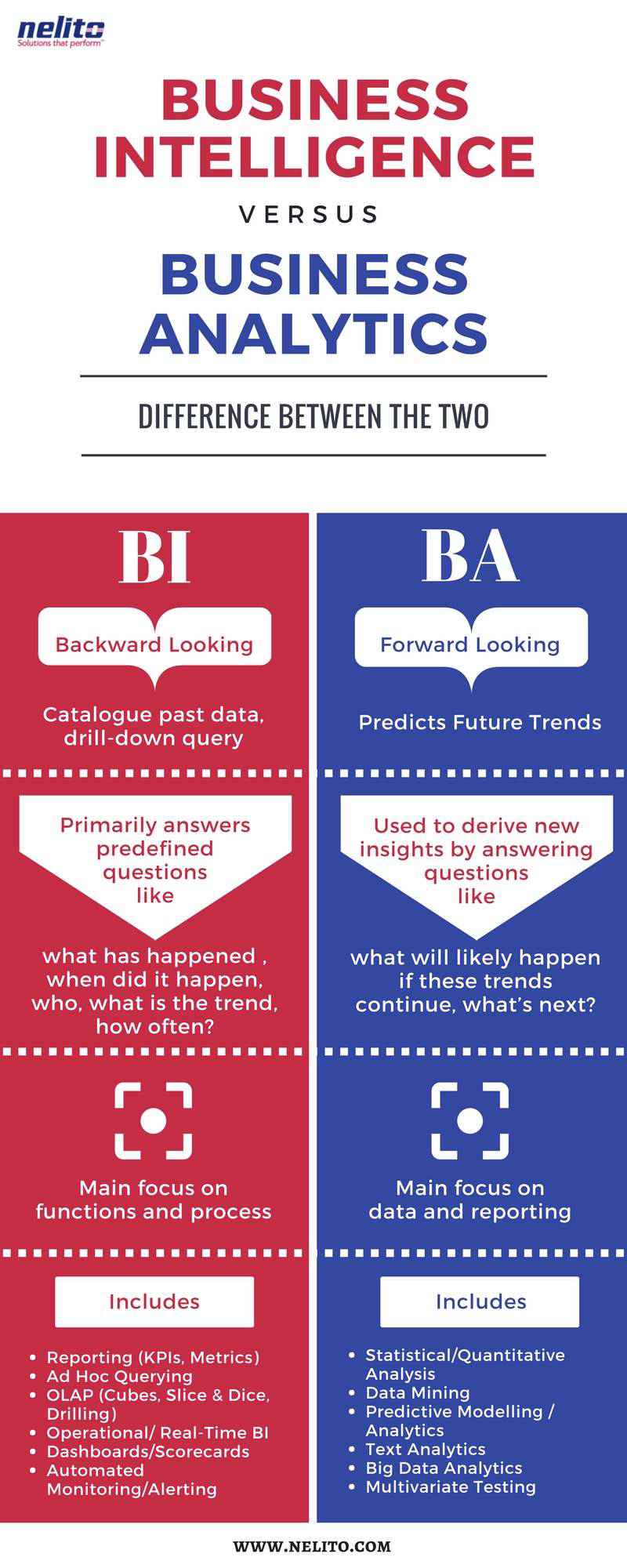Home Uncategorized List of Analytics Companies in Bengaluru. Blue Star Infotech Business Intelligence and Analytics Pvt. Ltd (formerly Activecubes Solutions ).
ByAugmented analytics deploys machine learning to change how analytics content is developed and used by the industry and its peers. This trendy technology integrates other analytical capabilities like business process management, data preparation, data management, process mining and data science.As the market innovates, Data and analytics vendors are upgrading traditional solutions to expand their product portfolios and services by offering competitive products and solutions.Here are the Augmented Analytics companies that make on the top 10 list in 2019.1.
Microsoft BIMicrosoft Power BI offers a host of services that incorporates interactive dashboards, data preparation, data discovery, and augmented analytics from a single product. Power BI Report Server allows users to share reports but lacks some of the machine-learning capabilities found in Power BI SaaS. Microsoft Power BI Desktop can be deployed as a stand-alone, free personal analysis tool to ease the authorization of complex data mash-ups which involve on-premises data sources.2. QlikQlik offers a host of services which include agile analytics, BI solutions and governed data discovery via its lead product Qlik Sense. The Qlik Analytics Platform enables developers to create customized applications useful for embedded use cases.
QlikView continues to be enhanced to make up a larger portion of the company’s installed customer base, while Qlik Sense now accounts for more than 50% of license revenue. QlikView’s in-memory engine gives its customers the power to build interactive and robust visual applications. Qlik NPrinting is an optional server component from the enterprise that supports Mode 1 BI with report distribution and scheduling facilities.3. TableauTableau empowers its users with drag and drop analytics without the need to know how to code to present their findings on an interactive dashboard. Tableau offers three primary products that are Tableau Desktop, Tableau Server and Tableau Online (on the cloud).
Tableau has always been committed to its users giving the power to explore and find insights in data. Tableau with its niche offerings has disrupted the market causing the competitors to stand up and take notice. As part of a shift in strategy toward large enterprise deployments and sales, Tableau has delivered on a number of promised enterprise features that appeal to an IT buyer.
It has recently released certified and recommended data sources for improved governance of large deployments; scheduling and alerting; an enhanced SDK and APIs; hybrid data support from the cloud; and added collaboration among others.4. IBMIBM is represented on this list with two products this year which include IBM Cognos Analytics and IBM Watson Analytics. Cognos Analytics version 11 and higher represents the rebranding of the Cognos Business Intelligence product (version 10.2.2 and earlier), to signify the integration of production reporting capabilities with self-service dashboards and ad hoc analysis within one modern analytics and BI platform Cognos Analytics is available both on-premises or as a hosted solution on the IBM cloud. Watson Analytics also provides augmented analytics capabilities, which includes support for NLQ generation, embedded advanced analytics via a cloud-only solution and automated pattern detection.5. SalesforceSalesforce rebranded its analytics portfolio from Einstein Analytics to Salesforce Analytics in November 2017 and the platform includes basic operational reports and dashboards for Salesforce data, Einstein Analytics-based packaged applications, Einstein Discovery and the Einstein Analytics Platform (formerly Wave).

The Einstein Analytics Platform is for creating dashboards, point-and-click interactive visualizations, and analysis with integrated self-service data preparation for Salesforce and non-Salesforce data. The Einstein Discovery is an augmented analytics platform leveraging machine learning to generate smart suggestions for data preparation, to automatically find visualization to document important insights in a story for every user, without requiring them to build models or write algorithms.6.
SAPSAP delivers a broad range of analytics and BI capabilities which are useful for both large IT-managed enterprises and business-user-driven modern deployments.The SAP offerings that are on the list include SAP Lumira (a module within Business Objects Enterprise) and the SAP Analytics Cloud solution. SAP Analytics Cloud’s machine learning technology augments the analytics process, helping users go from insight to action in a fraction of the time. Automated technology enables them to avoid agenda-driven and biased decision making by revealing the story of what drives the business.7.
SASSAS competes in the analytics and BI market with additional imprints in the data science and machine learning market. SAS Visual Analytics is the primary product offering that brings interactive discovery and dashboards in addition to reporting and scheduling for mainstream business users.
The advanced analytics capabilities within SAS Visual Analytics are geared toward citizen data scientists, who don’t need to be experts in the coding of specialist statistical skills. SAS Visual Analytics is available either in an on-premises deployment or through the cloud in SAS’s own data centers or from third parties vendors such as AWS.8.
TIBCO SoftwareTIBCO Spotfire was an early visual-based data discovery disruptor that transformed the market from traditional reporting to modern BI and analytics. Spotfire offers extensive capabilities for analytics dashboards which include interactive visualization and data preparation in a single design tool and workflow while offering flexible processing options either in-memory or in-database integration. To keep up with the market trends, TIBCO has continued to expand its feature set to include streaming analytics, location intelligence, data science, machine learning, data cataloging and, most recently, data virtualization through OEM relationships, integration with TIBCO middleware and acquisition. During the last year, TIBCO has continued to invest in marketing, land-and-expand initiatives and sales in order to generate renewed market awareness for an expansion in its installed base.9.
Bi And Analytics Companies Near Me
SisenseSisense offers an integrated analytics and BI platform encapsulating the entire workflow from data collection to storage developed on a self-contained in-memory columnar database. These facilities are supported with visual data exploration, in-chip processing, dashboards and recently added embedded advanced analytics features. OEM and embedded analytics continue to be the core area accounting for more than half of the company’s revenue.10.
MicroStrategyMicroStrategy Version 10 combines self-service data preparation & exploration with native big data connectivity over enterprise analytics and BI. MicroStrategy offers a fully interactive visual exploration experience integrating the best-in-class enterprise reporting and mobile capabilities delivered in a single, integrated platform and workflow. All these positives make it better-suited to governed data discovery deployments and large-scale SOR reporting for large and complex datasets than most other offerings.
What problems do you see when using big data analytics/technologies? (n=545)Challenges related to the lack of necessary skills were cited particularly often.

Approximately half of respondents reported having inadequate analytical or technical know-how for big data analytics.The current labor market has a shortage of qualified personnel in this area. This problem is not regional as both North American and European companies reported similar grievances. The rates for inadequate analytical and technical know-how are around 50 percent in both regions.Although companies may want to, they might not be able to fill them due to the lack of suitable candidates on the labor market. This shifts the focus towards training existing staff.Data privacy and security also rank high on the list of challenges for companies. The high value placed on data privacy is not surprising considering that many use cases revolve around customers.As analyses center even more on customers, companies will have to focus even harder on anonymizing data to protect customer privacy. That means elaborate processes will need to take place before the actual analyses begin.
The content, technical implementation and legal issues related to these processes all pose major challenges for companies today.When it comes to big data analytics, data security is also a major issue.Big data can contain business-critical knowledge. In addition, new problems can also arise in accessing new systems.Manufacturers, for example, regard anything accessing their machines to capture machine data with suspicion.
The reason is that these machines contain programs that are necessary for operations and must be protected as critical intellectual property.Companies also harbor insecurities about saving and transferring data in cloud-based systems (e.g. Social media). These uncertainties need to be addressed as well.38 percent of companies still complain of a lack of compelling business cases.This number is very high, especially given the amount of coverage big data receives in the IT and business media. It may be down to a lack of creativity in devising new ways to use or monetize data, or simply a reluctance to implement new methods and technologies for fear of failure.Technical issues, in contrast, are not the main obstacle to deploying big data technologies. Only 26 percent of respondents view them as a problem. No big differences between North America and EuropeAside from inadequate know-how, our survey results from North America and Europe were similar in other areas as well.Data privacy (50 percent in North America vs. 49 percent in Europe) and data security (56 percent in North America vs.
46 percent in Europe) stand out in particular. Contrary to popular belief, it does not appear that North American companies place less value on data privacy.The only noticeable differences lie with technical problems, which are more widespread in North America (30 percent vs.
Data Analytics Companies

This, however, is not surprising because North American companies are more likely to be forerunners with regard to big data analytics and adopt new technologies at an earlier stage. Problems by degree of big data adoption (n=525)A quick glance at the problems that companies face in the different stages of their big data initiatives reveals further insights.Those that currently have no big data initiatives planned appear to face two main dilemmas.While 56 percent of these companies have found no compelling business cases for big data processes, 50 percent stated that their business processes are not mature enough for big data.
Companies that currently have no initiatives but are considering them in the future have large deficits in the requisite skillsets and are more likely than average to encounter problems financing big data initiatives (48 percent).Surprisingly, companies that have already implemented big data analytics into their processes still reported high rates of inadequate know-how. Their most serious challenges, however, are data privacy and security, which they appear to have underestimated before. Challenges with big data analytics vary by industryWhile there are no major differences in the above problems by region, a closer look does expose a few interesting findings by industry.The finance sector is more likely than average to cite a lack of compelling business cases (53 percent).Manufacturing, however, faces more problems than average with inadequate know-how, both in analytical (63 percent) and technical (61 percent) respects. This is apparently a major obstacle that these companies will need to monitor on their road to “Industry 4.0”.In the public sector, data privacy (68 percent), costs (54 percent) and inadequate business cases (51 percent) top the list of common issues.For more findings, download our free report on Big Data Use Cases (see below).
Most Popular News
- Drivers De Chipset Hyperionpro Via 5.24a, 22.01.2010
- Ev Tipi Vakitmatik Kumandal
- Sonic Adventure Dx Download
- Histologia Di Fiore Pdf Descargar
- Sdata Tool 64gb Download
- How To Change Windows 10 Shutdown Sound
- How To Change Display Name In Hotmail 2019
- Drivers Huawei E303 Mint
- Download 2005 Mitsubishi Galant Owners Manual
- Windows Registry Firewall Enable
- Toogoo 200 Mg X 0.01 G
- Cat On A Hot Tin Roof (1958 Bluray 1080p
- Ax7 Development Speed Up Form Data
- Search Car On Public Property
- Tes5edit Could Not Open Registry Key
- Stephen Malkmus Groove Denied (2019)
- Install Stornext Linux Fsnameservers
- Resident Evil 4 Ultimate Hd Edition Mods
- Deserts Of Kharak Maps